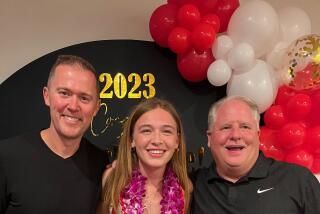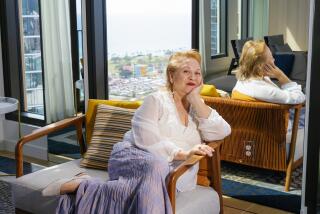Kim Hill dies at 44; woman’s childhood cancer battle inspired creation of Ronald McDonald House
- Share via
Kim Hill, whose childhood battle with leukemia was the catalyst for the creation of the first Ronald McDonald House in Philadelphia in 1974, has died. She was 44.
Hill died Saturday at UCI Medical Center in Orange, said her father, Fred Hill. Radiation treatments to overcome leukemia as a child had caused the formation of brain tumors as an adult, he said.
FOR THE RECORD
Kim Hill: The obituary in the March 9 LATExtra section of Kim Hill, whose childhood battle with leukemia was the catalyst for the creation of the first Ronald McDonald House in 1974, misspelled the name of the president and chief executive of Ronald McDonald House Charities. It is Marty Coyne, not Croyne.
“She’d been gradually getting worse,” said Hill, noting that his daughter, who had been living in an acute nursing facility in Orange the last 13 years, went into a coma March 1 and never woke up.
Fred Hill was a tight end for the Philadelphia Eagles in 1969 when he and his wife, Fran, learned that 3-year-old Kim had acute lymphatic leukemia.
“The doctor started crying when he told us,” Hill recalled. “He said kids don’t usually live with this type of leukemia for more than six months. We were devastated.”
But Kim defied the odds. Over the next 3 1/2 years, she underwent regular chemotherapy — as well as radiation to her brain every day for two weeks when she was almost 4.
In 1971, two years into their daughter’s treatment, the Hills helped organize a fundraising fashion show in which the wives of Eagles team members modeled fur coats.
“We only expected 10 ball players to be there,” said Hill, “but the entire football team showed up, including the owner and general manager.”
They raised $10,000 for the Leukemia Society of America.
“Owner Leonard Tose was the last guy to leave,” recalled Hill. “He said, ‘I want you to come back next year and make 10 times that amount. I’m going to give you Veterans Stadium to use if you need it, the football team — whatever you want.’”
Hill and his neighbor, Stan Lane, formed a nonprofit organization called Eagles Fly for Leukemia.
At Children’s Hospital of Philadelphia, they found Dr. Audrey Evans, whose long wish list included purchasing a house near the hospital that would provide temporary lodging for the families of young cancer patients.
After Eagles Fly for Leukemia raised $125,000 the next year, Eagles General Manager Jim Murray arranged with local McDonald’s franchise owners to have the team’s quarterback, Roman Gabriel, promote its St. Patrick’s Day shamrock shake in exchange for a share of the profits being donated to the purchase of a house for young patients’ families.
The McDonald’s owners then offered to donate all the profits on the condition that the house be named the Ronald McDonald House.
By the time the first Ronald McDonald House opened in Philadelphia in 1974, the Hills had moved to California.
Today, there are 302 Ronald McDonald Houses serving families in 30 countries and regions.
“I didn’t enjoy being sick,” Kim Hill told reporters in 1982. “But if I wasn’t sick, all of this might not have happened.”
“The Hill family’s struggle to remain close to their daughter Kim while she battled cancer inspired a doctor, a football team, and an entire community to create and build the first Ronald McDonald House in Philadelphia in 1974,” Marty Croyne, president and chief executive of Ronald McDonald House Charities, said in a statement.
Kim Hill, who was born Aug. 11, 1966, in Orange, had a typically active childhood after overcoming leukemia.
After the family moved to San Juan Capistrano in 1977, she rode horses with her two sisters. And she sang in the choir and ran cross-country at Capistrano Valley High School.
After graduating in 1984, she studied cosmetology. When her father, who sold medical supplies, opened a McDonald’s in Mission Viejo in 1987, she went to work there.
That same year, Kim’s son, Andrew, was born.
In 1991, a CT scan revealed she had two tumors between her brain and her skull. She underwent five operations over the next 11 years.
But through it all, her father said, “she was always positive. And it never got her down. She just wanted to see her son grow up and be with her family.”
In addition to her parents and son, Hill is survived by her sisters, Kyle Hill and Kristina Hill.
A memorial service will be held at 11:30 a.m. March 15 at Saddleback Church in Lake Forest.
More to Read
Go beyond the scoreboard
Get the latest on L.A.'s teams in the daily Sports Report newsletter.
You may occasionally receive promotional content from the Los Angeles Times.










